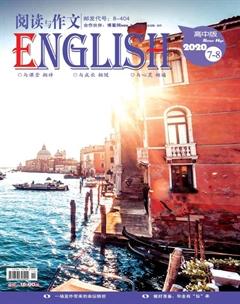英语中 反义疑问句的用法
1. 当陈述部分的主语是I,而句子又用来征询对方的意见时,附加疑问句中的主语用you。如:
I find English very interesting, dont you?
I dont like that film, do you?
2. 当陈述部分的主语是everybody, everyone, someone, nobody, no one, somebody等合成代词时,附加疑问句中的主语通常用they。但亦可用he,尤其是nobody, no one等作主语,具有否定概念时。如:
Somebody phoned while I was out, didnt they?
Everyone enjoyed the party, didnt they?
Nobody wants to go there, does he?
3. 当陈述部分的主语是不定代词everything, nothing, anything, something时,附加 疑问句中的主语一般用it,不用they。如:
Everything seems all right now, doesnt it?
Nothing is kept in good order, is it?
Something must be done to stop pollution, isnt it?
4. 当陈述部分的主语是指示代词this, that或these, those时,附加疑问句中的主语分别用it和they。如:
This is important, isnt it?
That isnt correct, is it?
These are your friends Tom and Jack, arent they?
5. 如果陈述部分是以代词one作主语,附加疑问句中的主语在正式场合用one,非正式场合用you,在美国英语中,在非正式场合还可以用he。如:
One cant be too careful, can one?或can you?
One should do his duty, shouldnt he?
6. 如果陈述部分用Im…结构,附加疑问部分一般用arent I。如:
I am strong and healthy arent I。
7. 当陈述句为there be结构时,附加疑问句中的主语也用there。如:
Theres no help for it, is there?
Theres something wrong, isnt there?
8. 陳述部分带有seldom, hardly, never, rarely, few, little,nowhere, nothing等否定词或半否定词时,附加疑问部分的动词用肯定形式。如:
Bob rarely got drunk, did he?
Few people know him, do they?
She seldom goes to the cinema, does she?
如果陈述部分的否定词带有否定前缀,那么,该陈述部分作肯定处理,附加疑问部分一般仍用否定形式。如:
He was unsuccessful, wasnt he?
Tom dislikes the book, doesnt he?
9. 当陈述部分为主从复合句时,附加疑问部分一般应与主句的主语和谓语动词保持对应关系。如:
She says that I did it, doesnt she?
I told them not everybody could do it, didnt I?
但当陈述部分的主语是I,谓语是think, believe, suppose, expect这类动词时,附加疑问部分则往往与从句中的主语和谓语动词保持对应关系,但要注意否定的转移。
I suppose that hes serious isnt he?
I dont think she cares, does she?
10. 当陈述部分是并列句,附加疑问句则需和就近的分句的主语和谓语一致。如:
Xiao Lin has been writing letters all afternoon but he should finish them now, shouldnt he?
11. 在由“祈使句+附加疑问”构成的附加疑问句中,附加疑问部分一般用will you, wont you, would you,有时也可用can you, cant you, why dont you, could you等。如:
Dont open the door, will you?
Give me some cigarettes, can you?
Take a rest, why dont you?
但是,以lets开头的祈使句,附加疑问部分用shall we;以let us开头的祈使句,如果含义是allow us,不包括听话人在内,疑问部分用will you。如:
Lets have a basketball match this afternoon, shall we?
Let us go out for a rest, will you?
12. 当陈述部分带有情态动词must表示“必须”时,疑问部分用mustnt。如:
You must work hard next term, mustnt you?
I must answer the letter, mustnt I?
但若表推测这层含义时,不能用must,而要根据陈述部分的不定式结构(即must之后的动词)以及含义采用相应的动词形式。如:
You must have made a mistake, havent you?
They must have seen the film last week, didnt they?
He must be in the library, isnt he?
13. 当陈述部分含有情态动词used to时,疑问部分可用usednt或didnt。如:
The old man used to smoke, didnt he?或usednt he?
Tom used to live here, usednt he?或didnt he?
14. 当陈述部分带有情态动词ought to时,疑问部分用oughtnt或shouldnt。如:
He ought to know the answer, oughtnt he?
We ought to read this book, oughtnt we?或shouldnt we?
15. 当陈述部分含有had better时,疑问部分用had。
如:Youd better finish your homework now, hadnt you?
16. 感叹句后的附加疑问句的谓语动词需用be的现在时,且常用否定形式。如:
What a clever boy, isnt he?
What a lovely day, isnt it?
17. 陈述句子中的主语为动词不定式短语、动名词短语或其他短语时,疑问部分的主语通常用it。如:
Learning how to repair motors takes a long time, doesnt it?
Between six and seven will suit you, wont it?
Where to hold the meeting has not been decided, has it?
18. 在口語和非正式文体中,为了加强语气,只是表示某种惊奇、怀疑、反感、讽刺等感情而并不是为了寻求回答,这时前后两部分的肯定、否定是一致的。如:
Oh, he is a writer, is he?
Youll not go, wont you?
19. 陈述句中的谓语动词是wish,表示愿望时用may,且用肯定形式。如:
I wish to have a chance to learn English, may I?
20. 当陈述部分带有表示“所有”含义的动词have(has)时,疑问部分既可用have形式,也可用do形式。如:
You have a new bike, havent you(或dont you)?
She doesnt have any money in her pocket, does she?
Sleeping Pills
安眠药
Bob was having trouble getting to sleep at night. He went to see his doctor, who prescribed some extra-strong sleeping pills.
On Sunday night Jack took the pills, slept well and was awake before he heard the alarm. He took his time getting to the office, strolled in and said to his boss, “I didnt have a bit of trouble getting up this morning.”
“Thats fine,” roared the boss, “but where were you Monday and Tuesday?”
鲍勃晚上很难入睡,就去找医生,医生给他开了一些特效安眠药?
星期天晚上鲍勃吃了药后睡得很好,而且在闹钟响之前就醒了?他从容不迫地到了办公室,慢悠悠地走进去,对老板说:“今天早晨我毫不费劲就起床了?”
“很好,”老板大声吼道,“那么星期一和星期二你在哪里?”
- 阅读与作文(英语高中版)的其它文章
- 明灯
- 同心锁被拆,爱仍长留心间
- 相见不如怀念?
- 外派海外工作
- 骑兵之败
- 凯瑞·穆丽根的好莱坞成名之路

